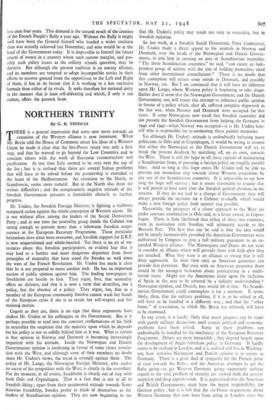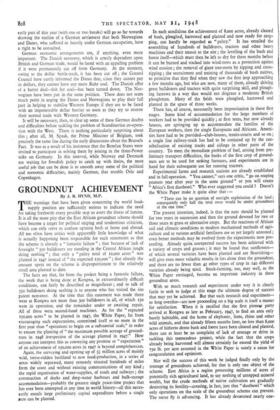NORTHERN TRINITY
By G. B. THOMAS THERE is a general impression that some new move towards an extension of the Western alliance is now imminent. When Mr. Bevin told the House of Commons about his ideas of a Western Union he made it clear that the five-Power treaty was only a first step, and that he wanted to go beyond the Low Countries and to associate others with the work of European reconstruction and pacification. At one time Italy seemed to be very near the top of the list; but it is realised that there are' several Italian problems that will have to be solved before the partnership is extended to the heart of the Mediterranean. An extension to the North, to Scandinavia, seems more natural. But in the North also there are serious difficulties ; and the conspicuously negative attitude of the Swedish Government presents a formidable obstacle to further progress.
Hr. Unden, the Swedish Foreign Minister, is fighting a stubborn rearguard action against the whole conception of Western union. He is not without allies among the leaders of the Social Democratic Party ; and at one time the neutrality group inside the Cabinet was strong enough to prevent more than a lukewarm Swedish acqui- escence in the European Recovery Programme. These particular hesitations have since been overcome, and Swedish support for E.R.P. is now unquestioned and whole-hearted. Yet there is an air of un- easiness about this Swedish participation, an evident fear that it may lead to a further and more dangerous departure from those principles of neutrality that have stood the Swedes so well since the wars of the French Revolution. Hr. Unden has made it clear that he is not prepared to move another inch. He has an important section of public opinion against him. The leading newspapers in Stockholm are hostile to him. They argue, first, that neutrality offers no defence, and that it is now a term that describes, not a policy, but the absence of a policy. They argue, too, that as a member of the European community Sweden cannot wash her hands of the European crisis if she is to retain her self-respect and her national morale.
Cogent as they are, there is no sign that these arguments have shaken Hr. linden or his colleagues in the Government. But it is perhaps possible to read into the constant reaffirmations of his faith in neutrality the suspicion that the majority upon which he depends for his policy is not so solidly behind him as it was. What is certain is that opinion in Norway and Denmark is becoming increasingly impatient with his attitude. Inside the Norwegian and Danish Governments opinion is hardening in favour of some closer associa- tion with the West, and although some of their members no doubt share Hr. Unden's views, the trend is strongly against them. The policy of Hr. Lange, the Norwegian Foreign Minister, who makes no secret of his sympathies with the West, is clearly in the ascendant.
For the moment, at all events, Stockholm is clearly out of step with both Oslo and Copenhagen. That is a fact that is not at all to Swedish liking ; apart from their sentimental attitude towards Scan- dinavian friendship, Swedes prefer to think of themselves as the leaders of Scandinavian opinion. They are now beginning to see that Hr. Unden's policy may result not only in neutrality, but in Swedish isolation.
So last week, at a Swedish Social Democratic Party Conference, Hr. Unden made a direct appeal to the neutrals in Norway and Denmark, over the heads of the Norwegian and Danish Govern- ments, to join him in creating an area of Scandinavian neutrality. " The three Scandinavian countries," he said, " can create an inde- pendent group of nations with the aim of holding themselves aloof from other international constellations." There is no doubt that this conception will attract some minds in Denmark, and possibly in Norway, too. But I am convinced that it will have no influence upon Hr. Lange, whose Western policy is beginning to take shape. Rather does it seem that the Norwegian Government, and the Danish Government, too, will resent this attempt to influence public opinion in favour of a policy which, after all, suffered complete shipwreck in the last war, when Norway and Denmark were occupied for five years. If some Norwegians now recall that Swedish neutrality did not prevent the Swedish Government from helping the Germans in 194o and 194r—when Norway was occupied—it is Hr. Unden him- self who is responsible for re-awakening these painful memories.
Yet although Hr. Unden's attitude is undoubtedly irritating many politicians in Oslo and in Copenhagen, it would be wrong to assume that either the Norwegian or the Danish Government will try to break the present deadlock by marching off, on its own, towards the West. There is still the hope in all three capitals of maintaining a Scandinavian front, of pursuing a foreign policy on roughly parallel lines. And so long as this hope exists Hr. Unden will be able to prevent any immediate step towards closer Western association by any one of the Scandinavian countries. It is impossible to say how long the hope will survive ; but it seems reasonable to assume that it will persist at least until after the Swedish general elections in the autumn. If they do not lead to a change of Government, they will always provide the occasion for a Cabinet re-shuffle which would make a new foreign policy both natural and possible.
Meanwhile, the prospects of a closer approach to the West are under constant examination in Oslo and, to a lesser extent, in Copen- hagen. There is little likelihood that either of these two countries, even in association with Sweden, will ultimately accede to the Brussels Pact. The best that can be said is that the idea would not be utterly inconceivable provided the American Government were authorised by Congress to give a full military guarantee to an ex- panded Western alliance. The Norwegians and Danes do not want to consider an alliance which will provide them with help after they are attacked. What they want is an alliance so strong that it will deter aggression. In their view only an American guarantee can provide that deterrent. But even with an American guarantee there would be the strongest hesitation about participating in a multi- lateral treaty. Might not the Americans insist upon the inclusion of Spain in the area to be covered by a military understanding ? Norwegian opinion, and Danish, too, would jib at that. No Scandi- navian Government could contemplate it for a moment. It seems likely, then, that the military problem, if it is to be solved at all, will have to be handled in a different way ; and that the "other forms " of association, to which Mr. Bevin has referred, will have to be examined.
In any event, it is hardly likely that much progress can be made with purely military discussions until certain political and economic problems have been solved. Some of these problems can undoubtedly be handled by the machinery of the European Recovery Programme. Others are more intractable ; they depend largely upon the development of Anglo-American policy in Germany. It hardly seems to be realised in London, and it is realised still less in Washing- ton, how sensitive Norwegian and Danish opinion is to events in Germany. There is a great deal of sympathy for the French point of view towards the Ruhr ; and the American attempts to get the Ruhr goingto get Western Germany going—apparently without regard to the vital problem of security are viewed with the gravest suspicion and deep apprehension. It is appreciated that the American and British Governments must have the major responsibility for German policy ; but it is felt that the six-Power negotiations about Western Germany that now have been going in London since the early part of this year (with one or two breaks) will go so far towards drawing the outline of a German settlement that both Norwegians and Danes, who suffered so heavily under German occupation, have a right to be consulted.
German economic arrangements are, if anything, even more important. The Danish economy, which is utterly dependent upon British and German trade, would be faced with an appalling problem if it were permanently cut off from Germany. At the moment, owing to the dollar bottle-neck, it has been cut off ; the Control Council have curtly informed the Danes that, since they cannot pay in dollars, they cannot have any more Ruhr coal. The Danish offer of a barter deal—fish for coal—has been turned down. The Nor- wegians have been put in the same position. There does not seem much point in urging the Danes and Norwegians to play their full part in helping to stabilise Western Europe if they are to be faced with an impenetrable dollar barrier so soon as they try to restore their normal trade with Western Germany.
It will be necessary, then, to clear up some of these German doubts and difficulties before tackling the problem of Scandinavian co-opera- tion with the West. There is nothing particularly surprising about this ; after all, M. Spaak, the Prime Minister of Belgium, took precisely the same line during the early discussions about the Brussels Pact. It was as a result of his insistence that the Benelux States were invited to participate in solving them by joining in the three-Power talks on Germany. In this interval, while Norway and Denmark are waiting for Swedish policy to catch up with theirs, the most useful job that can be done is to smooth away some of the political and economic difficulties, mainly German, that trouble Oslo and Copenhagen.



































 Previous page
Previous page